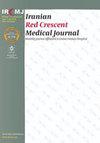Effectiveness of Crisis Intervention Program in Post-traumatic Stress Symptoms in COVID-19
IF 0.2
4区 医学
引用次数: 0
Abstract
Background: At the close of 2019, the world faced a phenomenon that plunged all human beings into extreme fear and anxiety. A new type of coronavirus began to spread among people across the globe, and this was the beginning of one of the greatest pandemics and its associated problems in the world. People with COVID-19 have low psychological tolerance and are highly exposed to psychological disorders. One of the most important psychological disorders that can harm the mental health of people affected by COVID-19 is post-traumatic stress disorder (PTSD). Objectives: The present study aimed to evaluate the effectiveness of the crisis intervention program in PTSD symptoms among people with COVID-19. Method: This applied experimental study was conducted based on a pretest-posttest control group design. The statistical population consisted of all individuals with COVID-19 in Rasht, Iran, in 2019, of whom 30 people were selected using the available sampling method and were randomly assigned to the experimental group (n=15) and the control group (n=15). The participants in the experimental group received 10 sessions of the crisis intervention program. Mississippi (2006) PTSD analogy (Scale) was used to collect data. Data were analyzed using the analysis of covariance. Results: The results showed a significant difference between the post-test scores of the experimental and control groups, demonstrating that the crisis intervention program was effective in PTSD (re-experience, withdrawal, numbness, arousal, and masochism) in COVID-19. The subjects in the experimental group had significantly less post-traumatic stress in the post-test group than those in the control group (P<0.01). Conclusion: It can be concluded that the use of crisis intervention programs can reduce PTSD in people with COVID-19. Therefore, it is recommended that psychologists use this therapeutic approach to reduce the psychological problems of people in crisis.危机干预计划对 COVID-19 中创伤后应激症状的影响
背景介绍2019 年年末,世界面临着一个让全人类陷入极度恐惧和焦虑的现象。一种新型冠状病毒开始在全球范围内的人群中传播,这也是世界上最大的流行病之一及其相关问题的开端。COVID-19 患者的心理承受能力较低,极易出现心理障碍。创伤后应激障碍(PTSD)是危害 COVID-19 感染者心理健康的最重要的心理障碍之一。研究目的本研究旨在评估危机干预项目对 COVID-19 患者创伤后应激障碍症状的疗效。研究方法本应用实验研究采用前测-后测对照组设计。统计人群包括2019年伊朗拉什特所有COVID-19患者,采用现有抽样方法从中选出30人,随机分配到实验组(15人)和对照组(15人)。实验组的参与者接受了 10 节危机干预课程。采用密西西比(2006 年)创伤后应激障碍类比(量表)收集数据。数据采用协方差分析法进行分析。结果显示结果显示,实验组和对照组的后测得分有明显差异,表明危机干预项目对 COVID-19 中的创伤后应激障碍(再体验、退缩、麻木、唤醒和受虐)有效。实验组受试者的创伤后应激反应在后测试组中明显低于对照组受试者(P<0.01)。结论可以得出结论,使用危机干预计划可以减轻 COVID-19 患者的创伤后应激障碍。因此,建议心理学家使用这种治疗方法来减少危机人群的心理问题。
本文章由计算机程序翻译,如有差异,请以英文原文为准。
求助全文
约1分钟内获得全文
求助全文
来源期刊

Iranian Red Crescent Medical Journal
医学-医学:内科
自引率
0.00%
发文量
0
期刊介绍:
The IRANIAN RED CRESCENT MEDICAL JOURNAL is an international, English language, peer-reviewed journal dealing with general Medicine and Surgery, Disaster Medicine and Health Policy. It is an official Journal of the Iranian Hospital Dubai and is published monthly. The Iranian Red Crescent Medical Journal aims at publishing the high quality materials, both clinical and scientific, on all aspects of Medicine and Surgery
 求助内容:
求助内容: 应助结果提醒方式:
应助结果提醒方式:


